Dune: Spice Wars Kept Me Up Till 4AM Because It's Just So Good
Dune: Spice Wars, the newest strategy game set in the world of Dune, is out now in early access for everyone. I had a chance to spend some time with it and it was really intense and exciting, though not perfect.
1
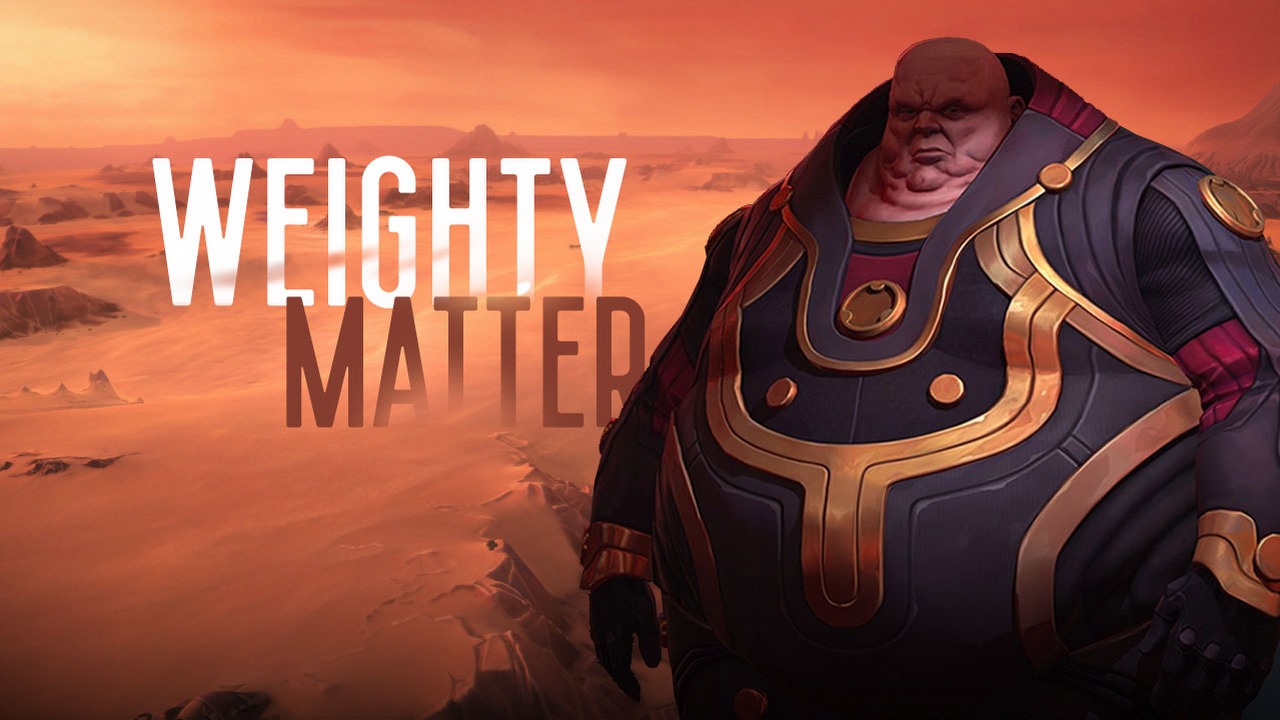
It finally arrived! A few months after the rather surprising announcement at The Game Awards in December, the developers from Shiro Games released their latest game – Dune: Spice Wars. Since I am a huge fan of this universe, I was happy to smash the pitiful Atreides family with the hard gauntlet of the Harkonnen as I expected. What you're about to read are the first impressions of the difficult mission of conquering Arrakis, which I collected during several sessions lasting a total of nine hours.
War for Arrakis like never before
Let's get one thing out of the way first. Dune: Spice Wars isn't an attempt to refresh the legendary RTS games from Westwood Studios – it has nothing to do with these games. Yes, the gameplay also takes place in real time, we collect the spice and recruit armies, but all the similarities to those classics end there. This is a completely different type of strategy game, it's more focused on numbers, with a complex system of interdependencies that govern the development of the desert empire; if you're not got at planning, it's easy to irreversibly lose an hour of your efforts. Mastering this network of various dependencies allows us to create a well-functioning organism on Arrakis and it is absolutely crucial if we want to eliminate our opponents and take full control of the planet.
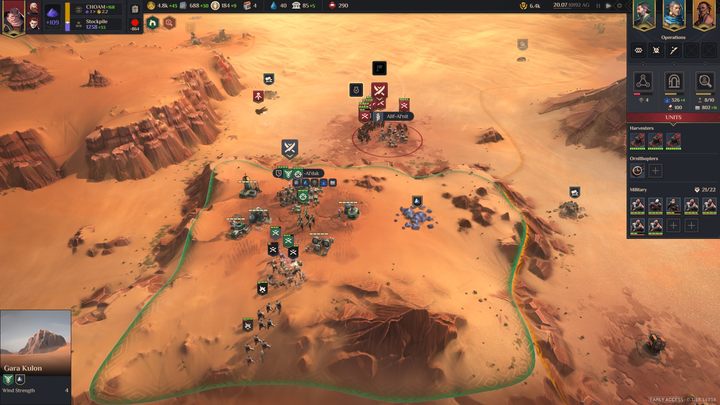
WHAT SPECIFICALLY DO WE GET IN EARLY ACCESS?
As part of early access, we get access to all sides of the conflict (Harkonnen and Atreides, as well as Fremen and smugglers) and can fight on randomly generated maps. There are four difficulty levels and three map sizes to choose from, and all gameplay mechanics also work. In addition to the faction, we also choose two of four available advisers who offer various bonuses.
The game isn't very forgiving to beginners – even though it looks rather quiet at the beginning, you actually have to hurry. We begin the game with a rather underdeveloped capital and one ornithopter, allowing us to explore nearby regions and points of interest, which offer various finds, from broken equipment, ruins of old settlements, spice fields, sources of other raw materials or neutral settlements. The extraction of the spice melange quickly becomes a priority in the first phase of the game, as it's not only a solid source of cash, but also allows you to meet the requirements of the Emperor, who every now and then demands a tribute in the form of this precious substance (this fee is also systematically growing, and it's not easy).
We decide ourselves how much spice will go into the silos, and how much we will transfer – this is just one of the elements of the aggressive micromanagement that Dune: Spice Wars requires at almost every stage. Harvesting the raw material is a continuous effort (the harvesters do not have to return to the refinery after filling up), unless there's a sand worm in the area. If we do not react quickly enough, the harvesters will fall prey to the desert monsters, and we will have to waste precious time waiting for new ones to spawn. Indeed, in this game, lost harvesters respawn over time, and we "only" lose their crews, which – to be honest – is still a severe punishment for reacting too slowly to a sand worm alert.
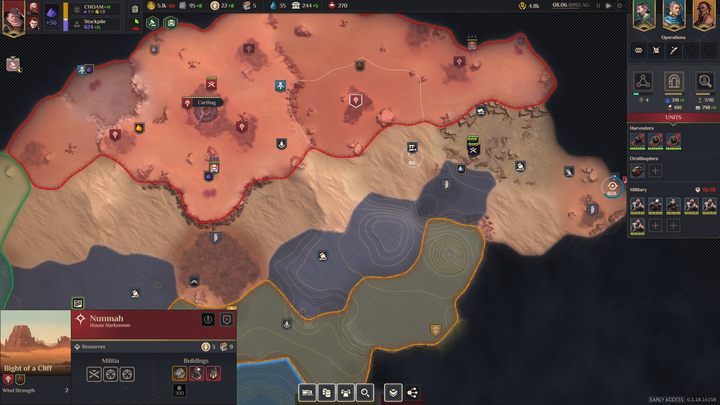
The collection of the spice itself isn't the most important goal of the game, although it's always worth controlling as many deposits as possible (because you need to pay the tribute). What requires the most effort is conquering new regions of the planet, as well as maintaining remote bridgeheads, which are sometimes attacked by other factions (Atreides, Fremen or the smugglers), and local groups of desert bandits hiding in the fortified sietches. The aggressive march for riches would probably be much easier if, like the second Dune, the game would allow to methodically build an army composed of increasingly sophisticated tanks. Unfortunately, it is not that easy. We only have foot soldiers at our disposal, and creating a large army is effectively prevented by the command index – one of many factors in this game that you need to watch out for. In other words, money isn't everything. You can have more solaris from selling spice to KHOAM than you know what to do with, but that won't be enough to create a capable military force that would be enough for attacking and defending. Defense is generally entrusted to the local militia here.
In addition to managing the units on the map, we also need to take care of a few additional dimensions of gameplay. The first is diplomacy, and it seems to be the one still requiring the most polishing and refinement from the devs, because it's basically limited to trading with other factions. The espionage module is much more interesting – not only can we dispatch agents into enemy territory, but also take part in special operations that yield specific bonuses. The latter are very useful, as I quickly learned during the attack on the capital of Atreides. Regenerating supplies and energy, as well as reducing the enemy's firepower, made it much easier for me to win.
There's also an extensive technology tree in the game, where you have to skillfully select the areas for further activities, because each new research takes increasingly long, as well as a Landsraad voting module. It's worth spending a minute or two thinking about what we want to vote for, because we may secure support of additional forces, or reduce the maintenance costs of our installations this way. There are also votes concerning negative perks and – what's very important – they can give us an edge, too, if they're directed at our enemies.
One big headache
Here, finally, we get to the most important thing that distinguishes Dune: Spice Wars so much from the old RTSs of Westwood studio. The product of Shiro Studios is extremely tangled in that network of interconnected mechanics, requiring meticulous planning of subsequent investments and moves. Say you want to set up a missile battery that will help you defend from surprise attacks. You're more than welcome to do it, but remember that you pay for such frills not only with plasteel in a one-off transaction, but you also need to take care of the maintenance of this installation. You might be thinking that the militia will have a much better chance against an attack if they're aided by the rocket defense. Sure, the chances are good for that, but remember that people need water, so if you mess up global water management, you're running a serious risk of mutiny and riots. And this goes on and on. Each investment needs to be carefully considered and the good of the entire state should be taken into account, because a few wrong decisions will bring about problems that you never expected.
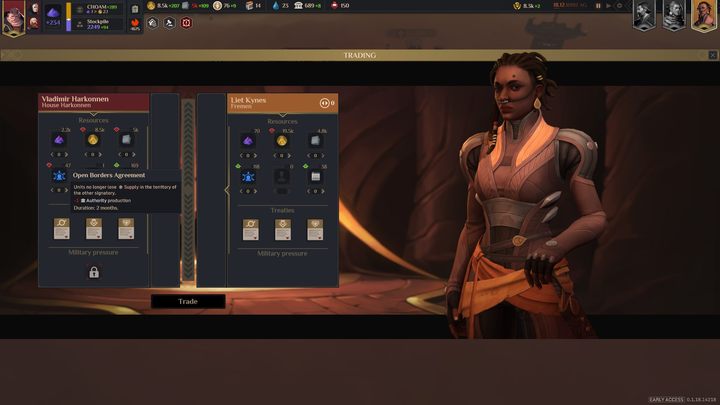
It takes time to understand how it all works, so it wasn't until the third attempt that I was able to comfortably expand my little empire under the Harkonnen banner and smash my competitors to dust. There were some surprises during the first tries. One of the most interesting of these was about moving troops, specifically when crossing vast deserts. In this game, the walkers have a supply stat that decreases as we get further away from our territory. If it drops to zero, the army will start losing HP. So, one time my army died practically on the outskirts of the hostile settlement – weakened by the prolonged journey, the force was unable to defeat the defenders. The enemy had a similar blunder as well, because on another occasion, they made a desperate attempt to walk across large stretches of no-man's-land, but to my satisfaction, crumbled somewhere mid-way.
To further pump the challenge, the game additionally provides other attractions. Every now and then the Landsraad council meets, during which all interested parties vote on various resolutions, often those that hinder governance and spoil the resource economy of individual member states. In addition, there are the diplomacy (the panel itself, as I already mentioned, seems to be less extensive than the one from Civilization and is basically only suitable for trading) and espionage. As if all this was not enough, Dune: Spice Wars also serves various random challenges, both beneficial and detrimental. In the case of the latter, we're always forced to do something irritating (such as lose some money), but it's better to try anyway, because the punishment for idleness can be even more severe.
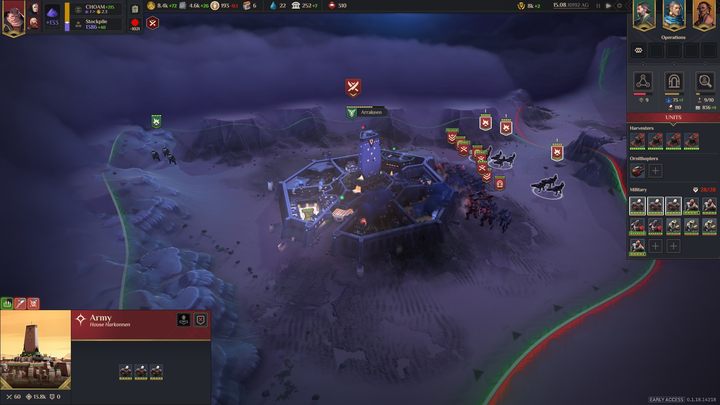
To sum up, after the first hour of the adventure with the new Dune, I was utterly confused. There's a ton of things that you have to keep in mind, and then you really have to learn the ropes to be sure that your actions are actually going to be effective and productive. Of course, it's not as complicated to say it's mind-boggling, but Dune: Spice Wars will be surely shunned by the type of RTS enthusiast, for whom the pinnacle of tactical knack was building 20 sonic tanks and moving them towards the enemy base. It's a different pair of shoes.
There is water in this desert
After an afternoon session that unexpectedly extended to early morning, I can say that I really like the game. This doesn't mean, however, that there are no visible downsides to this game that could strongly affect its reception. First of all, micro-management. Gee-whizz, this is a strategy game, I understand, but it seems that you have to take care of every trifle the authors could come up with. Some things can be quickly eliminated in patches, and a great example of this is the handling of harvesters. Harvesters generally do their thing in the fields without your intervention, but they are occasionally attacked by the sand worms, so it would be a good idea to send them back to base in those moments. In case of danger, the game allows you to manually make them flee, but after an hour of gameplay, we'll happily turn on the auto-escape option, just so we don't have to remember about it every single time. So what's the problem? Well, the thing is that there's no auto-return option to complete auto escape – once they flee, you have to manually order them back into the field. It would be nice if things like that were eliminated in the patches. Dunie: Spice Wars just requires so much clicking to deal with nonsense like that, which is even more irksome later in the game, when harvesting becomes of secondary, or even tertiary importance. Okay, it's still there and it's even nice to watch, but we've got more important things to do here.

The game could also use a better tutorial, because the one it dons right now seems laconic to say the least. It does explain how things work, sure, but the player doesn't get the full picture of the discussed mechanics, and they have to learn all the remaining dependencies by trial and error. I can easily imagine players quickly giving up on the game just because they can't clearly understand all the dependencies governing the game, can't build their first spice refinery, or understand how the Landsraad council voting actually works. You know, it's still early access, but it's worth thinking about the future.
As for the rest, I was more than happy. Spice Wars not only looks good, but also sounds great, especially in terms of the OST. The game sports a phenomenal atmosphere and you can really feel the vibe of the hostile, hazardous planet, which was so pronounced in the imagination while reading Herbert's books. I was as happy as a kid when the first harvester set out into the field, and I watched with awe as sandstorms ravaged my settlement. In fact, I felt a pleasant tingling sensation minutes after launching the game as my first squad tried to take control of a village near the capital. The fight was practically won, mainly thanks to the rocket fire from the Harkonnen Palace, but the offensive was ultimately quenched by sand worms. That's when I knew I was home.
Finally, all I have written here are my feelings based on a nine-hour session where I only tested one faction and only won once on the normal difficulty level. Just bear this in mind – this isn't a review or anything; I feel I'm just scratching the surface for now. As I mentioned, I have had a lot of fun with the game so far, and I'm quite excited to see how the Atreides handle on a larger map this afternoon. So the enthusiasm is considerable – the question is whether it will be the same in a dozen hours. Time will tell.
1
Latest News
- Huge Marvel Adventures mod now with new superheroes, including Sentry
- Butcher's Summit, an impressive free diselpunk FPS, has been released
- Free FPS on Half Life engine gets big update
- On February 3, gaming history could change forever. Red Dead Redemption 2 one step away from a major achievement
- This is not the RPG you expected. Crimson Desert abandons the key elements of the genre, going for original solutions


